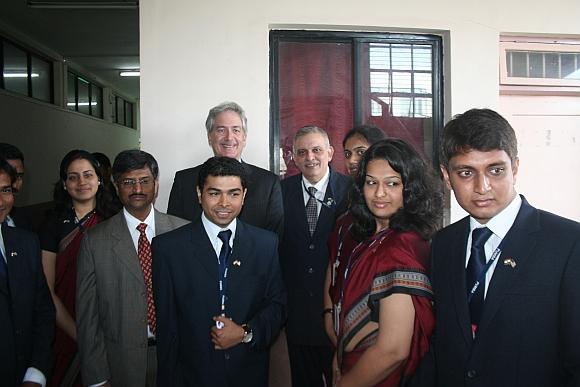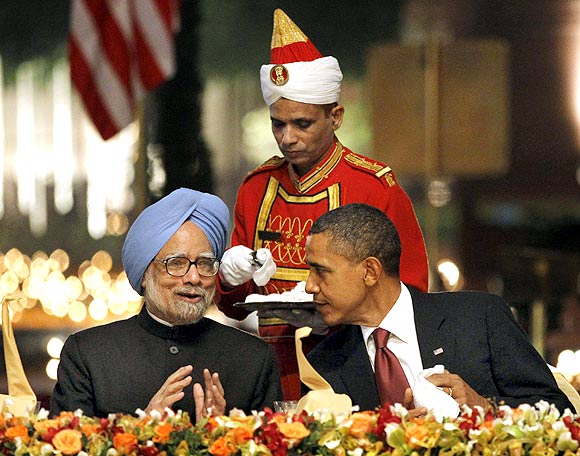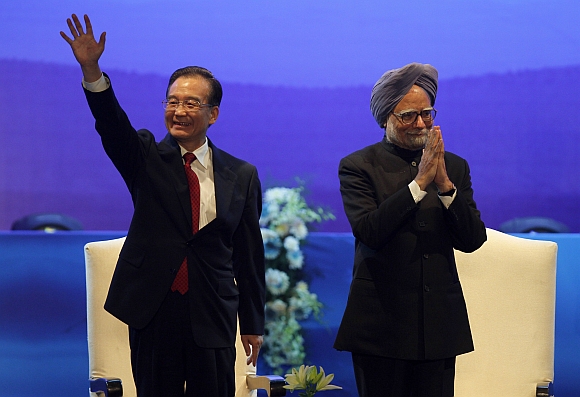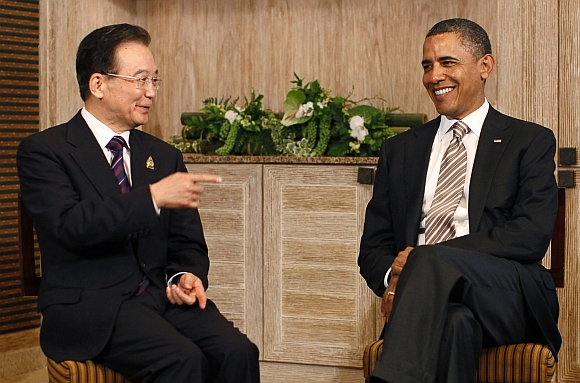 | « Back to article | Print this article |
Is US indirectly asking India to contain China?
The United States of America, say experts, is gently nudging India to contain the rise of China's assertiveness in the Asia Pacific region without antagonising the latter.
"Some may reach the mistaken conclusion that the United States focus on Asia is part of a policy to contain China -- it is not," remarked United States deputy secretary of state, William J Burns while addressing a group of students and faculty at the Pune University.
"That is neither our purpose nor our intention," he quickly added giving an impression that the US doesn't want a direct confrontation with China, which in recent times, is flexing its naval muscle and assertiveness in the South China Sea, a passage that straddles the Indian Ocean and the Pacific Ocean.
In the same address though, the US deputy secretary underscored "India's strong presence across the Indian and Pacific Oceans," as "a source of comfort and affirms its potential as a net security provider in the maritime domain."
While he was obviously referring to Indian Navy's recent skirmishes with Somalian pirates as a founding member of the international Contact Group on Piracy off the Coast of Somalia, experts rediff.com spoke with said that the US is cleverly asking India to engage and counter China's growing assertiveness in the Asia Pacific.
Click NEXT to read further...
'US is gently nudging India to look East than West'
India has shown great leadership in the efforts to confront and roll back piracy that emanates from Somalia and threatens trade flows to and from Asia. The US commends Indian efforts that have included naval ship deployments to the Gulf of Aden, escorting ships through unsafe waters, and stopping numerous pirate attacks, Burns said in his address.
"Didn't Burns equate Gulf of Aden and Straits of Malacca and said that US looks forward to partnering with India in containing piracy in these two regions," asks Dr Shrikanth Paranjpe, who teaches at the department of defence and strategic studies, Pune University.
"I think the US is gently nudging India to look East than West," he said emphasising "The US cannot directly enlist India in China's containment in the Asia Pacific region."
"As the US expands its role in countering piracy, whether in the Gulf of Aden or the Straits of Malacca, we will look for increased opportunities to partner with India, alongside our traditional Allies, new and emerging partners, and with ASEAN," said Burns in his 22-minute address to a crowd of about 180 people gathered at Pune University.
'China's absence from consulting process in Asia Pacific intriguing'
Col (retd) Anil Athale remarked that though there was nothing significant that Burns's address contained he pointed out that the US looks towards India for fulfilling a strategic role in the region without confronting China. For him, the US deputy secretary stating that they do not look forward to contain China was the most significant part of his address.
It is in this context, and in tune with what Paranjpe postulated, that one finds intriguing the absence of China from a consultation process that the US plans to start on regional issues in the Asia Pacific. "We are also launching a new US-India-Japan trilateral consultation on regional issues," Burns said in his address.
Citing India and US as world's two largest democracies, which last year launched a strategic dialogue on the Asia-Pacific to ensure that they pursue strategies that reinforce one another and added "We understand the importance and effectiveness of multilateral approaches to regional and global issues, and appreciate India's growing participation and leadership role in these efforts."
'China is not yet a threat to the US'
It is instances like these that make defence strategists and experts opine that while the US wants China as an economic bulwark when it comes to strategic partnership the US looks forward to "India as a more trustworthy partner."
"We hope that India will join us in working to strengthen key Asian regional institutions -- from the East Asia Summit to ASEAN," Burns said without mentioning China, which he averred that the US is not looking forward to contain.
Jayant Umranikar, former Maharashtra director general of police and Pune police commissioner only puts things into perspective and offers a balance when he says that "the US is till now looking China as a challenge to its clout in the Asia Pacific."
"China is not yet a threat to the US," he underlines adding "it is because of these reasons that the US is joining hands with India on strategic issues in the region."
Check out our TOP photo features
Click on MORE to see another set of PHOTO features...




